Cuisine
From Lagos to Soweto: Here Are Some Mouthwatering African Street Foods You Should Know
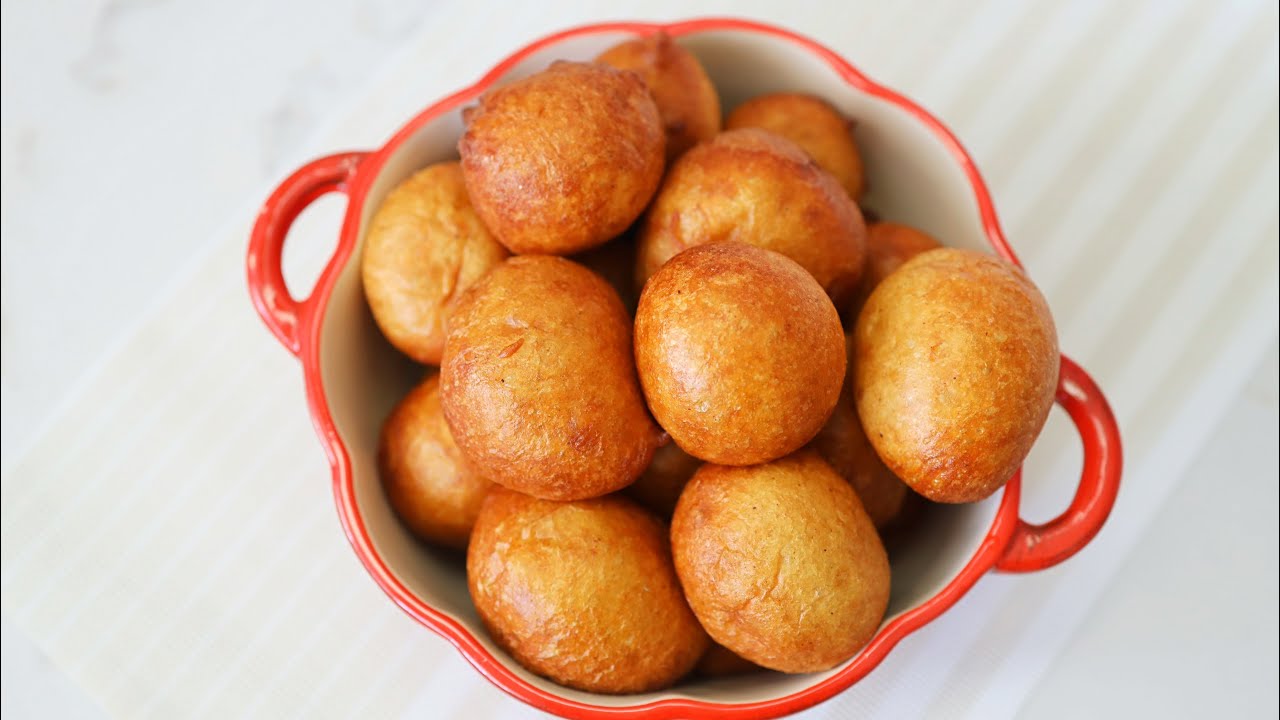
Credit: Sisi Yemmie/YouTube
From Nigeria to Egypt and South Africa, African bustling streets are a treasure of an unending supply of tasteful street foods that can serve as a snack or even a whole meal. The best of these street foods is that they are perfect for when you’re on the move and are packed with flavours that bring joy to your taste buds.
So when next you find yourself in Lagos, or Soweto, ensure you grab a street food that speaks to the roots and origin of the country. But who says you need to travel halfway across the world to experience African street foods? Thanks to African food content creators sharing their recipes online, you can recreate these tasty street foods from the comfort of your kitchen.
See below our top African street foods you should know:
Kosua Ne Meko (Egg and Pepper)
The mention of eggs brings a particular country to mind, Ghana! “Kosua Ne Meko” is a beloved quick Ghanaian snack sold by street vendors throughout the country. Living up to its name (Kosua means ‘egg,’ ne translates to ‘and,’ and meko refers to the sauce or relish) Kosua Ne Meko is a hard-boiled egg split slightly down the middle and stuffed with a spicy pepper sauce, which is mostly made of fresh sweet tomatoes, scotch bonnet peppers, onions, salt and sometimes, garlic and ginger.
One unique feature of this snack is the way the eggs are cured by dredging the shell-on cooked eggs in dampened salt before peeling. This is said to intensify the flavours of the eggs. It’s also a very easy and quick snack to make and an even better way to eat your boiled eggs. Watch Telande World make it here.
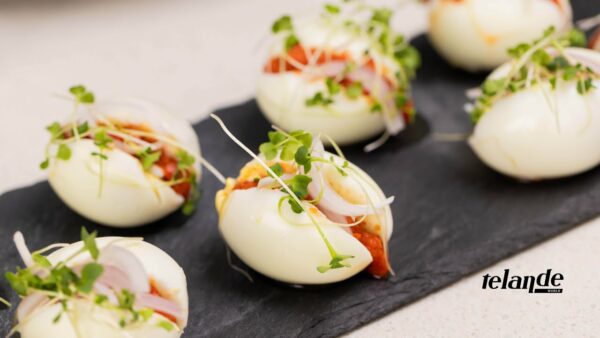
Credit: Telande World
Bole/Dodo Ikire/Kelewele
Have you ever met a Nigerian who doesn’t like plantain? In Nigeria, there are different varieties of snacks made from plantain, according to the country’s regions. Take “bole” (pronounced buh-li) for example This popular grilled plantain is a roadside staple. In Lagos, it is mostly eaten with groundnut or palm oil, while in Port-Harcourt, it is eaten with spicy palm oil stew and roasted fish.
There is also “dodo ikire,” a sweet and rubbery plantain snack from the town of Ikire, in Osun state. Made from overripe plantains mashed with pepper and salt, it’s deep-fried in palm oil until it reaches a beautiful black colour, then moulded into bite-sized balls and sprinkled with crushed scotch bonnet pepper seeds. And don’t forget the neighbouring country, Ghana. Their “kelewele” is a must-try – fried plantain bites marinated in a flavorful blend of ginger, onion, and chilli paste.
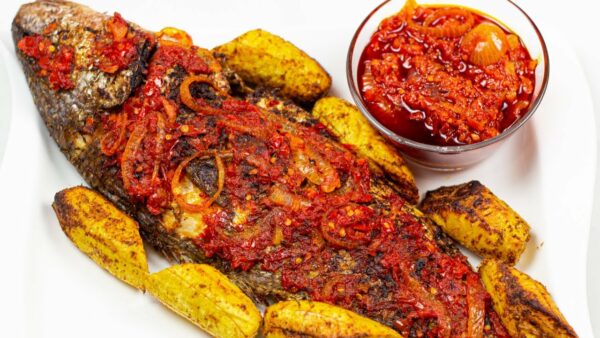
Credit: Daniel Ochuko/YouTube
Puffpuff/Buffloaf/Mikate/Vetkoek
This staple traditional snack, known as Puffpuff in Nigeria, has warmed its way into the hearts and stomachs of people across the continent. While the name changes from country to country – Buffloaf (or Bofrot) in Ghana, Bofloto in Ivory Coast, Mikate in Congo, Micate (or Bolinho) in Angola, Legemat in Sudan, Kala in Liberia, and Vetkoek or Magwinya in South Africa and Zimbabwe and so on – the delicious essence of Puffpuff remains the same. It’s truly the queen of African snack foods.
Making Puffpuff is relatively simple. Flour, yeast, sugar, butter, and water are the essential ingredients, with some adding eggs and spices like nutmeg for an extra kick (all optional). The fluffy dough is shaped into small balls and then deep-fried until golden perfection. After frying, some like to roll them in sugar for added sweetness, while others prefer a hint of cinnamon or vanilla.

Credit: SisiYemmie/YouTube
Suya
Hailing from Northern Nigeria, Suya is a skewered meat sensation that’s taken hold across West Africa, inspiring other variations of grilled meat recipes. Traditionally made with thinly sliced beef, Suya can also be found using ram, chicken, or even turkey. The key to its flavour lies in the spicy Yaji marinade. This aromatic blend combines kulikuli (dehydrated peanut) powder with dried ginger, garlic, pepper, salt and other spices to create a sweet punch. Suya is typically served with sliced onions, cucumbers, cabbage and extra Yaji for dipping.
But there’s one more element that adds to the Suya experience – the newspaper wrapping.
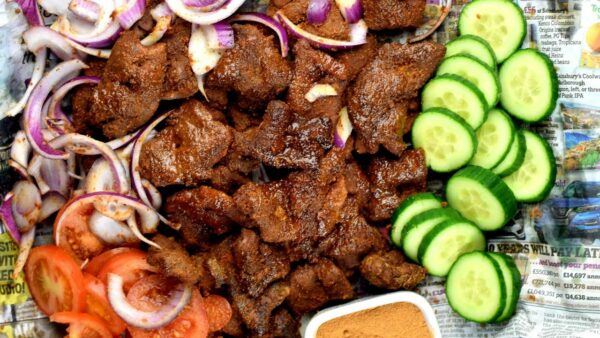
Credit: Sisi Jemimah/YouTube
Rolex
No, this is not the Swiss watch, Rolex is a delicious and versatile street food in Uganda. It is prepared by rolling an omelette and your favourite chopped vegetables in a chapati (a thin pancake made of unleavened wholemeal bread) and cooked on a skillet. The best part of Rolex is its adaptability – keep it simple with eggs, shredded cabbage and green peppers, or go all out and add cheese, chicken, tomatoes, cilantro, or whatever your taste buds desire.
Typically served as a single-portion dish, Rolex can be eaten at any time of the day.

Credit: Phil’s Kitchen/YouTube
Dibi/Afra
Dibi, a succulent grilled meat dish made from lamb, reigns supreme as a street food favourite in Senegal. Its popularity spills over into neighbouring West African countries like Gambia and Guinea, where it’s known as Afra. While Dibi shares some similarities with Suya (both are grilled and well-seasoned), their flavour profiles differ. Suya relies on Yaji marinade, while Dibi takes a bolder route with mustard as its star ingredient. Interestingly, Suya gets wrapped in newspaper, but Dibi is presented on brown paper.
Preparing Dibi is straightforward. The lamb is marinated in a simple mix of vegetable oil, salt, and pepper, then grilled to perfection. The accompanying mustard sauce is made by simmering mustard with caramelised onions. Dibi can also be made with chicken, ram, or even turkey.
It can also be eaten as a sandwich, tucked into a crusty French baguette.
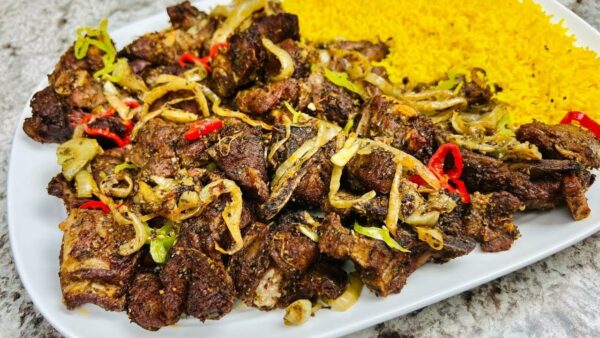
Credit: Dash of Dalinda/YouTube
Koshari
Let’s take a culinary trip north to Egypt and discover Koshari, a vegetarian snack that dominates the street food. This dish is a mix of textures and flavours, featuring a beautiful layering of grains (rice), pasta (vermicelli) and protein-packed legumes (chickpeas). Each bite offers a textural contrast.
Koshari’s magic doesn’t stop at the base ingredients. It comes alive with a trio of incredible sauces. First, a spiced tomato sauce adds a touch of tangy sweetness. Next, dukka, a garlicky and cumin-infused sauce, delivers a warm, earthy note. Finally, for those who crave a kick, sheteita, a fiery cayenne pepper sauce, brings the heat. These sauces are drizzled on top, along with a sprinkle of crispy fried onions.
Koshari’s versatility makes it a perfect anytime meal. Craving a breakfast? Koshari is there for you. Need a satisfying lunch? Look no further. Or, if you’re searching for a light dinner, Koshari will hit the spot.
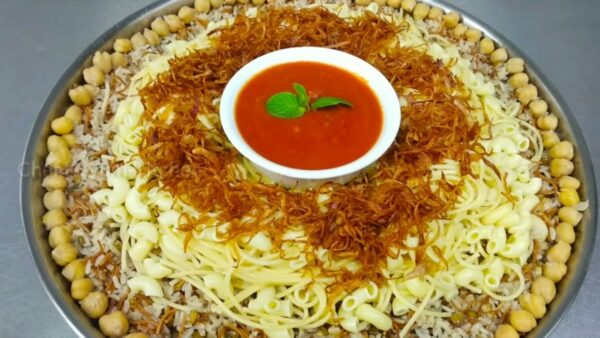
Credit: Chef Kayum Kitchen/YouTube
Kota
A multi-layered sandwich snack, Kota is Soweto’s best-known street food that has been a favourite for generations. The name “kota” meaning “quarter,” reflects the use of a quarter loaf of bread.
This handheld sandwich is built with a hollowed-out quarter of bread, then filled with a base layer of seasoned fries, and an array of delicious options, ranging from sausages to eggs, cheese, meat, and other fillings. Kota is a quick, inexpensive and mobile snack. Perfect for students or workers who are on the move.

Credit: Judy_M/YouTube




















